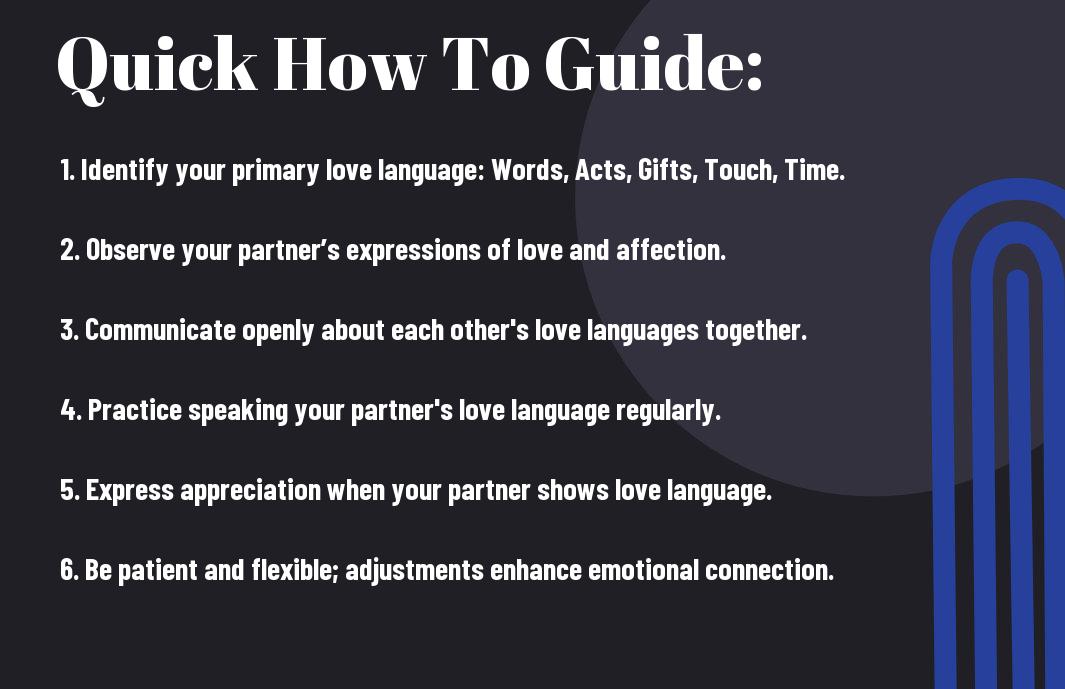Effective communication is necessary for nurturing your relationships, and understanding love languages is a key step in this process. By identifying your own love language and that of your loved ones, you can better express affection and strengthen your connections. In this post, you’ll learn about the five love languages, which will empower you to enhance your emotional bonds and avoid common misunderstandings. Unlock the potential of meaningful communication and let your relationships thrive through a deeper understanding of how to convey your feelings.
Understanding Love Languages
While everyone expresses and perceives affection differently, grasping the concept of love languages can enhance your relationships significantly. By recognizing how you and your loved ones communicate affection, you can create a deeper emotional connection and minimize misunderstandings. This framework encourages open conversations about needs and desires, fostering intimacy and bond in your relationships.
The Five Love Languages
You may find that your way of expressing love falls into one of the five distinct categories: Words of Affirmation, Acts of Service, Receiving Gifts, Quality Time, and Physical Touch. Each language serves as a unique avenue to communicate deep feelings of appreciation and care, allowing you to connect on a more profound level with those around you.
Identifying Your Love Language
While understanding others’ love languages is vital, recognizing your own is equally important. This introspection enables you to articulate your needs more effectively and promotes healthier interactions. By acknowledging what makes you feel valued and cherished, you can guide your partners, friends, and family towards ways to express their affection that resonate with you.
This process involves reflecting on your emotional responses to different forms of affection. Pay attention to how you feel loved, as well as how you naturally express love to others. Take note of your reactions to words, actions, time spent together, gifts, and physical intimacy—these insights will illuminate your primary love language. Identifying your love language can profoundly impact your interpersonal dynamics, fostering more meaningful connections and enhancing mutual understanding.

How to Express Affection
There’s no one-size-fits-all method for expressing affection, as each individual feels and receives love differently. Understanding your partner’s love language can empower you to communicate your feelings in a way that resonates with them. By aligning your actions with their preferences, you can deepen your emotional connection and enhance your relationship.
Tips for Each Love Language
If you want to effectively express affection, tailor your approach based on your partner’s love language. Here are some tips:
- For Words of Affirmation, offer genuine compliments and express your feelings in writing.
- For Acts of Service, help out with chores or prepare a meal.
- For Receiving Gifts, surprise them with thoughtful presents that show you care.
- For Quality Time, prioritize uninterrupted moments together.
- For Physical Touch, initiate small gestures like hugs or holding hands.
Any of these tailored actions can make a significant impact on your relationship.
Creative Ways to Show Love
Show your love with creativity by thinking outside the box and personalizing your gestures. Unique surprises can breathe new life into your relationship and make your partner feel truly cherished.
This might involve planning a spontaneous adventure, crafting a handmade gift, or even creating a special playlist of songs that resonate with your shared experiences. Effective gestures not only reflect your understanding of their love language but also demonstrate a commitment to fostering your connection. By unleashing your creativity, you can create memorable moments that lead to deeper emotional bonds and a stronger relationship. Genuine and thoughtful expressions of love will have a lasting impact, making both you and your partner feel valued and appreciated.
Factors Influencing Love Languages
Once again, understanding the intricacies of love languages goes beyond mere preference; several factors shape how you express and receive affection. Consider the following influences:
- Cultural Background
- Personal Experiences
- Gender Roles
- Family Dynamics
Assume that being aware of these elements can enhance your ability to connect meaningfully with others.
Cultural Background
You may find that your cultural background plays a significant role in shaping your love language. Different cultures value various ways of expressing affection, which can inform how you engage with your partners. For instance, some cultures emphasize verbal affirmations, while others may prioritize acts of service or physical touch.
Personal Experiences
If you’ve had positive or negative personal experiences in relationships, these events can heavily influence your love language development. Your childhood, past partnerships, and even friendships shape what you value most in expressions of love and connection.
Influencing your love language, past relationships often leave lasting imprints on how you perceive affection. Positive experiences may cultivate a preference for physical touch or acts of service, encouraging you to seek these affirmations in future connections. Conversely, negative experiences might lead you to shy away from certain love languages, instilling an acute sensitivity to how affection is expressed. Recognizing these influences can help you understand your desires and communicate them effectively with others, nurturing healthier, more fulfilling relationships.
How to Communicate Effectively
Not every attempt at communication leads to understanding. To convey your affection, it’s vital to engage in open and honest conversations while remaining receptive to your partner’s perspective. By establishing a safe space for dialogue, you contribute to a deeper connection and foster an environment where love languages can be expressed freely.
Active Listening Skills
The foundation of effective communication lies in active listening. This involves not just hearing what your partner says, but truly understanding their emotions and thoughts. Focusing on their words, asking clarifying questions, and reflecting on what you’ve heard helps to build trust and demonstrates your commitment to the relationship.
Verbal and Non-Verbal Communication
You must be aware of both verbal and non-verbal cues to convey your affection successfully. Effective communication is more than just words; it also includes your body language, tone of voice, and facial expressions. A warm smile or a gentle touch can reinforce your messages, making them resonate more profoundly with your partner.
Listening to your partner’s verbal and non-verbal communication is vital in ensuring your message is received correctly. Words may articulate your thoughts, but body language conveys your emotions. A mismatch between what you say and how you express it can lead to confusion or misunderstandings. Therefore, staying attuned to both aspects, and aligning them can fortify your ability to express affection meaningfully, thus enriching your relationship.

Tips for Strengthening Relationships
For anyone looking to enhance their connections, focusing on key elements can make a significant difference. Consider implementing these strategies:
- Practice active listening to foster communication.
- Show appreciation regularly to strengthen bonds.
- Be open to feedback for mutual growth.
- Engage in shared activities to create lasting memories.
- Be patient and understanding during conflicts.
After following these tips, you should see a noticeable improvement in your relationship dynamics.
Regular Check-Ins
If you want to nurture your relationship, regular check-ins can be incredibly valuable. Set aside time each week to discuss your feelings, concerns, and aspirations. This practice encourages transparency and helps both partners stay aligned with each other’s emotional states.
Adapting to Your Partner’s Needs
Your partner’s emotional needs may differ from your own, highlighting the importance of adaptability. Discovering how to best support them can build a stronger connection.
Understanding your partner’s individual love language is important for fostering a loving relationship. Whether they respond to words of affirmation, acts of service, or quality time, paying attention to these positive aspects allows you to show genuine affection. It’s important to communicate openly about what makes each of you feel valued. By acknowledging both the positive and any potential challenges that arise in this process, you can create a safe environment where personal growth and emotional well-being can flourish.
Navigating Conflicts with Love Languages
All relationships encounter conflicts, but understanding each other’s love languages can transform these challenges into opportunities for deeper connection. By identifying and acknowledging how you and your partner express affection, you can navigate disagreements more effectively. You may find that what feels like an emotional disconnect is simply a matter of misinterpreted love languages, leading to deeper insights and stronger bonds.
Understanding Misunderstandings
While it’s common to assume your partner knows how you feel, misunderstandings often arise from mismatched love languages. For instance, if you value words of affirmation but your partner prefers acts of service, your expressions of love might feel inadequate to each other, leading to frustration and resentment.
Resolving Differences
With a clear understanding of each other’s love languages, you can bridge emotional gaps and foster a more harmonious relationship. Start by openly discussing how each of you expresses love and how you prefer to receive it. This transparency can alleviate negative feelings and lead to more effective communication.
Misunderstandings often stem from a lack of awareness of your partner’s love language, resulting in feelings of neglect or frustration. By addressing these differences, you can employ positive strategies to foster understanding. Actively practicing each other’s love languages not only nurtures your bond but also promotes a healthy dialogue about needs and expectations, significantly enhancing your connection and paving the way for a more resilient relationship.
Conclusion
Upon reflecting on the concept of love languages, you can see how understanding these distinct ways of expressing affection can enhance your relationships. By identifying your own love language and that of your partner, you better equip yourself to communicate your feelings effectively and foster deeper connections. Embracing this knowledge allows you to navigate emotional interactions with greater sensitivity and appreciation, ultimately enriching your experience of love and companionship.
- My Friend Dog - March 16, 2025
- My Friend Dog - March 16, 2025
- Unlocking the Secrets to Wealth – A Guide on How to Harness the Power of Money and Success in Your Life - January 6, 2025
Views: 3

